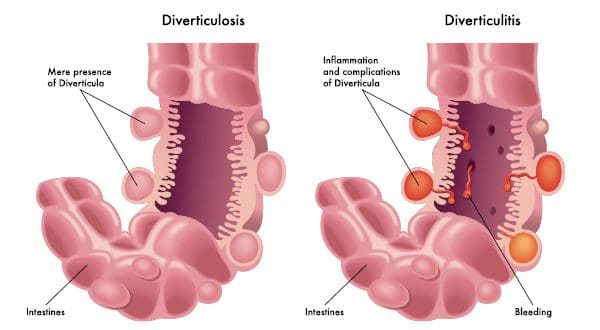Diverticular Disease
Diverticular disease is a condition affecting the large bowel in which there are small out-pouchings or pockets of the lining of the bowel protruding through its muscle wall. The cause of this is largely unknown, but seems to be related to long term irritable bowel syndrome and long term constipation. Long term abuse of laxatives may also play a part.
Diverticulitis occurs when the necks of these pockets become obstructed by feces causing stagnation and an overgrowth of bacteria, producing inflammation. Diverticular disease is a term used to encompass both diverticulosis and diverticulitis. In the majority of cases, diverticular disease causes no symptoms and is often just picked up incidentally. However, there may be some intermittent mild left-sided abdominal pain associated with either constipation or diarrhea. Acute diverticulitis, on the other hand, tends to present as severe pain in the left lower abdomen, frequently accompanied by fever and constipation. It can be complicated by the development of an abscess, peritonitis or perforation of the bowel.
Treatment and general recommendations for diverticular disease
- Moderate exercise, such as a daily walk, and some stretching exercises are beneficial. Try some gentle massage of the abdomen over the tender areas.
- During an acute attack of diverticulitis bed rest is advisable.
- Colonic irrigation and enemas may help but can only be used with caution under medical supervision, and not during acute inflammation.
Diet
- Drink 8 to 10 glasses of water daily.
- Avoid – nuts and seeds (unless passed through a grinder) and wholegrain breads, as hard little particles can become stuck in the necks of the bowel pockets and trigger off a bout of diverticulitis. However, ground nuts and seeds provide a tasty, nutritious powder that can be sprinkled on cereals or vegetables and won’t aggravate the bowel.
- You need to avoid all dairy products and gluten as they are digestive irritants. Gluten is found in wheat, rye, oats and barley (and all foods containing these).
- It is essential that at least 40 percent of the diet is made up of raw fruits and vegetables.
- Include often – high fiber foods like fruits and vegetables.
Recommended books
Raw juicing
During an acute attack a juice fast for three to four days is a good idea to rest the gut. Pureed vegetable soups can also be consumed.
The following recommended recipe is from the book “Raw Juices Can Save Your Life”.
Inflammatory Bowel Disease Juice
Ingredients
- 1 carrot
- 2 sticks celery
- 2 cabbage leaves or 2 dandelion leaves
- 2 inch (5 cm) slice beetroot
- 2 apples or 2 pears
- 2 spinach or 2 kale leaves
Method
- Wash, trim and chop and pass through juicer – make enough for 32 oz (one liter) of juice per day. You may need to dilute the juice with 50% water (or even more water), as the inflamed intestines may not be able to handle a concentrated juice.
- Drink small amounts, 3 to 7 oz (100 to 200 ml) of the diluted juice, every few hours during the day, to make up a total of around 32 oz (one liter).
Recommended supplements for diverticular disease
- MSM Plus Vitamin C
Take 1/2 teaspoon twice daily in vegetable juices or water – MSM is organic sulfur which will help assist in reduction of inflammation and also assist the liver with bile production, aiding digestion. - Super Digestive Enzymes
Take 1-3 capsules at the beginning of each meal – Digestive enzymes help with digestion and reducing inflammation of the bowel. - Intestinal Para Clean
Take 2 capsules twice daily with food. The herbs in this formula help to reduce the levels of pathogenic microbes in the intestines, which can promote infections and inflammation of the intestines. - Ultimate Gut Health powder
Take 1 level scoop daily. Ultimate Gut Health keeps your intestines as healthy as possible. Designed to soothe, heal and repair the gut lining, you will find your intestines love this powder.
The above statements have not been evaluated by the FDA and are not intended to diagnose, treat or cure any disease.


Leave A Comment